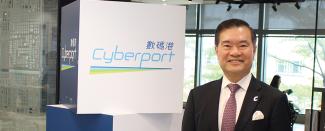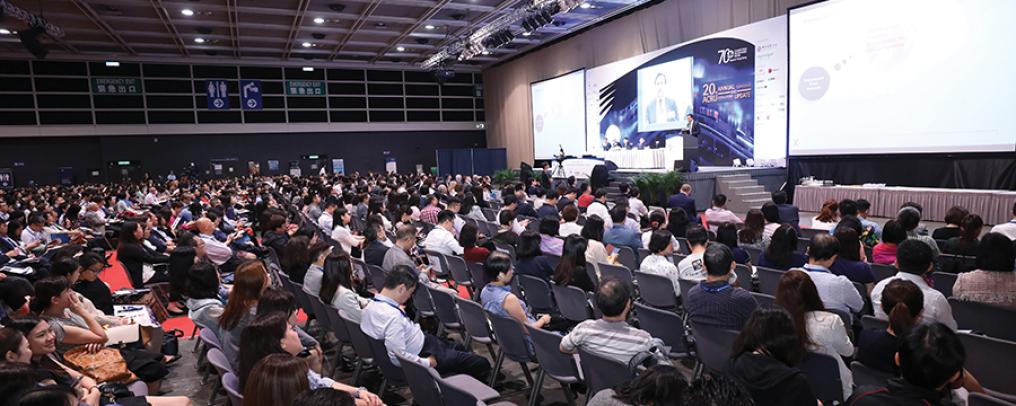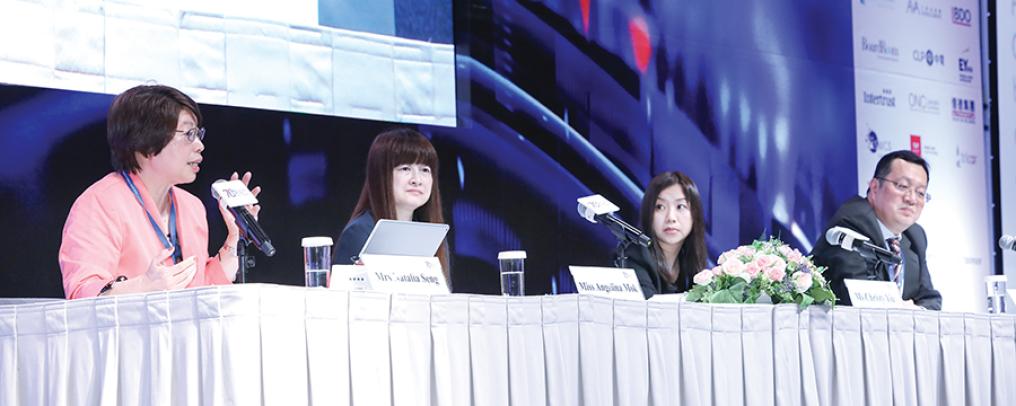Tech is not just for Cyberport, says Dr George Lam, Chairman, Hong Kong Cyberport Management Company Ltd, tech is for everybody, including governance professionals.
Do you think people in Hong Kong are aware of just how radical the transformation of our lives and work will be as the result of technological innovation?
‘Over the past three years, you can see fundamental changes in Hong Kong. Three years ago, when discussing the economy, people were mostly talking about real estate and stocks. Now people talk about innovation and technology, about unicorns, start-ups and tech entrepreneurs. The whole mindset and the whole cultural shift is now moving towards Hong Kong as the leading international innovation and technology centre for China and Asia.
We are living in a really exciting and interesting time – the fourth industrial revolution. Now data is the new currency and artificial intelligence (AI) is the new software. The next wave of major productivity gains will come from AI, which will be embedded in a lot of different products, as tiny as our electric toothbrushes or as big as our commercial jets. In this new era, digital is the so-called “new English”, because young people need to be digital savvy to get a good job – or even to find their future spouse or partner, or to enjoy education that can help them develop further.
But the digital divide is still as wide and dangerous as ever, so we need to put more effort and investment into education. You cannot just have smart cities supporting smart economies without having smart citizens – education is key.’
Do you think Hong Kong has adopted the right strategy to respond to these changes?
‘In the future, the most important assets will be digital assets. The traditional economy was all about physical assets, such as buildings, cars and equipment, but the most valuable asset in the new economy is data.
Hong Kong is already the number one asset management centre in the world for traditional assets, but going forward, it is important for Hong Kong to be the digital asset management centre. I think we are well positioned for the data-driven innovation era because of our One Country, Two Systems governance framework. We have an excellent foundation of the rule of law, an excellent British common law tradition, and perhaps the best protection for intellectual property, privacy, commercial contracts and personal freedom – everything that is needed for a smart economy.
Hong Kong also has one of the best digital infrastructures on earth, be it fibre optic cable network and satellite systems, or internet data centres and telecom towers, or near-perfect power supply stability and continuity, which is a key competitive advantage in the digital era. So, with all these competitive advantages, Hong Kong is the best place to store, safeguard, manage, transact and apply data. This is why we are the general terminal of the digital Silk Road and the international data hub for the Belt and Road.’
Could we discuss your current work and your aspirations as Chairman of Hong Kong Cyberport Management Company Ltd?
‘While we are 100% owned by the HKSAR Government, we are managed professionally as a company governed by an independent board and day-to-day managed by a professional team. Because of this unique framework, we are very entrepreneurial – indeed we are like a start-up ourselves, we are starting up a new phase of development for Hong Kong.
Cyberport is a complete tech ecosystem with over 1,300 tech companies and start-ups, including one of the largest fintech clusters in Asia, with over 350 fintech start-ups covering everything that you can think of, including e-wallet, robo-advisory, robo-trading, high-frequency trading, virtual banking, virtual insurance, e-ID (electronic identity), e-KYC (electronic Know Your Customer), blockchain, cybersecurity, AI and big data.
It is important to have clusters. For example, in the old days, if you wanted to find a wedding card, you would go to Wanchai where all the wedding card shops could be found. If you want to do fintech, you come to Cyberport. A cluster brings together critical mass, a lot of collaboration, synergy and cross-fertilisation. It brings like-minded people to work together without having to re-invent the wheel, and gets them a lot of attention from key stakeholders such as tech investors and the media.’
What would be on your wish list of things to help Cyberport in its work?
‘Well, the list is long but I should start with people. We need to get the best people (top-calibre tech experts, tech entrepreneurs and tech investors) to Hong Kong, and we also need to train and to develop our people. Look at Silicon Valley’s history – it became a success because of its open-mindedness and its very open immigration policy. If you were good at tech, whatever your nationality, you were invited to join. We need to be even more open and open-minded than Silicon Valley was then, and we can do it because multicultural and multilingual Hong Kong is in every aspect Asia’s world city and free port.
So we have to bring in the best talent from around the world and their families – if you don’t have the families coming as well, they are passers-by. We need them to feel like they are at home here and we must strengthen our support infrastructure (such as schools and housing). Once they are here, English is our working language, so they will have no problem. Moreover, it’s only 30–45 minutes to the Greater Bay Area. So we are like Silicon Valley, plus Boston, New York City, Austin, San Francisco, Los Angeles, Vancouver, Toronto, Dublin and London all together.
This will also create quality jobs for Hong Kong people, which is the ultimate impact we want to achieve. If we attract the best tech companies and talent to come to Hong Kong, they can work alongside and train up our people and give our people the chance to realise their dreams. That will also enrich our DNA, our gene pool. After all, our only capital in Hong Kong is talent.
In addition to getting the right people, we also need to strengthen our role and our capabilities as Asia’s leading venture capital hub. The success of Silicon Valley wasn’t only down to the tech entrepreneurs and the start-ups, but also the vibrant venture capital industry there. So we need to attract more world-class venture capital, both people and organisations, to Hong Kong, to have abundant risk capital to fund our start-ups.
In the current environment under the trade war uncertainties, I think we should take matters into our own hands and further build up our own infrastructure and our own ecosystem by investing more in innovation, technology and talent. Hong Kong is already doing that. If you look at successive HKSAR Government budgets over the past three years, you can see that the capital allocated to the innovation and technology sector came from a very modest base to some very respectable numbers in just three years or so. This is a very good momentum and my forecast is that this will continue to increase.’
Do you think that Hong Kong has been slow to establish a regulatory environment to encourage new fintech businesses?
‘HKSAR Government policies and regulations also have to evolve. We have only just started in the past three years in a big way. I think we have good momentum, but we need to keep that up and quicken the pace, otherwise we will have a very challenging phenomenon where the entrepreneurs are embarking on a 200-metre sprint but the regulators are taking a slow walk after dinner. They need to be in tandem.
I think the key now is to maintain the current strategy of working closely with the start-up community, because the start-up community is actually the key driver for reform. We have a tech talent entry scheme that means, for example, if you come to Cyberport and you need talent to build your business successfully, you can potentially put your applications through a green channel to get the relevant work permits faster. Another example is the easy landing scheme which helps to attract top-calibre tech organisations to come to Cyberport to add to our ecosystem.
We have also been talking to Hong Kong Exchanges and Clearing Ltd (HKEX), lobbying for more green channels for capital market access. Now, biotech companies that are at the pre-revenue stage can list on the Hong Kong stock market, but what about digital-tech companies – if they are pre-revenue and have good growth potential can they also list? These are the things that we have been lobbying for, so the entrepreneur community in Hong Kong is a catalyst for policy and law reform in the digital era.’
But is there also another side of that debate – perhaps the regulators need to be going at a slower pace because those regulations are there to protect investors?
‘I think we need to find the optimal balance, but if you look at fintech, 90% of the time innovators are stretching the envelope, or perhaps going into an area that the existing regulations are not detailed or updated enough to cover. That’s why Cyberport’s connections and communication channels with regulators are something that entrepreneurs really value. Our connections mean that, when entrepreneurs stretch the envelope, we can help them to communicate, clarify and consult with regulators. The chance that an entrepreneur is breaking the law is therefore minimised, while the chance for improving that law is maximised.
The whole world is undergoing digital transformation, including regulators. So the regulators themselves are under pressure to become more tech-savvy. After all, digital tools and digital solutions can make a regulator’s life easier and more successful. Tech is not just for Cyberport, tech is for everybody, we all need to become tech-savvy.’
Does that include governance professionals?
‘Certainly. These days we are in the era of e-governance and this is transforming the work of governance professionals. A lot more organisations in the world are now governed digitally – how many people in the world these days put in time sheets, or leave or overtime applications? Everything is done digitally. Auditors, company secretaries, financial controllers, internal audit managers, internal control managers, chief compliance officers – all of these important roles are now actually in the digital age.
So governance professionals need to be tech-savvy, they cannot afford to lag behind. There are many tech tools to help governance professionals function better. If you want to fly a plane, you have to know how to use the instruments, but even if the plane is largely automated the pilot’s judgement, experience, discipline, skills and training are still important. AI has been improving the diagnosis and treatment process but experienced skilled doctors are still indispensable – AI only makes them more productive and impactful and their life easier. Likewise, ongoing developments in regtech and legaltech (which are two new hot areas being targeted by Cyberport’s fintech cluster) will make governance professionals more productive and impactful and their life easier. So there will always be a good job opportunity waiting for a well-prepared, tech-savvy governance professional.’
Lastly, can we discuss your own career background?
‘I studied maths and computer science at university, and got my master’s in systems science. Then I joined one of the biggest companies in Canada – Bell Canada, the largest telecommunications company in the country then. I became a manager and then went to business school to get my Master of Business Administration (MBA). In my work, I became very involved in dealing with regulators, pressure groups and the HKSAR government, so later I studied to get my Master of Public Administration (MPA), a PhD at the University of Hong Kong Centre for Asian Studies and professional qualifications in law.
I came back to Hong Kong and became the youngest general manager working for Hong Kong Telecom. After a few years, I was invited to join A.T. Kearney, a Chicago-based American international management consulting firm, as the youngest partner. Then I had the opportunity to join Singapore Technologies Telemedia, a tech business of Singapore sovereign fund Temasek Holdings, in Singapore. I was executive director of telemedia, so I was involved in acquisitions, mergers and direct investment across Asia.
After Singapore, I came back to Hong Kong and went into investment banking. I joined the Bank of China group’s investment banking business and became Chief Operating Officer (COO), and later Vice-Chairman, for the investment banking division. After a few years there, I joined Macquarie, where I have been for 12 years in various non-executive advisory roles covering the Asia region. First I was in investment banking, now in the asset management area. The firm is now one of the largest asset management companies in the world, particularly in the infrastructure business.
So I moved from tech into management, and from management into management consulting, and then banking and finance. But over the past 15 years or so, I have been doing more and more public service and getting involved in international affairs, because I decided that making money and building a career is fine, but what is more important to me now is helping the younger generation and my community. That’s why I have served in various volunteer/advisory roles such as the HKSAR Government’s Central Policy Unit, the Financial Services Development Council New Business Committee, the Legal Aid Services Council, the Education Bureau School Allocation Committee, the Commission on Smoking and Health, the Hong Kong Trade Development Council, the Belt and Road Committee and Digital Silk Road Working Group, the United Nations ESCAP Sustainability Business Network and the Pacific Basin Economic Council, and so on, and now Cyberport and the HKSAR Government’s Committee on Innovation, Technology and Re-industrialisation.
I believe in team work. That’s why my role at Cyberport is perfect for me. I like round tables, I like teams. I like engagement and partnership. I also think it is important for Hong Kong to move decisively into the innovation and technology era, and I fully support the HKSAR Government’s strategic policy decision to significantly increase our effort and investment in innovation and technology. I hope Hong Kong will continue to do more in this direction. It’s important to ensure the creation of a digital Hong Kong. Going forwards, I would like to ensure that Hong Kong can play an excellent role in making the Greater Bay Area the world’s new Silicon Valley.’
Dr Lam was interviewed by Kieran Colvert, Editor, CSj, and Mohan Datwani, Solicitor, and the Institute’s Senior Director and Head of Technical & Research.



